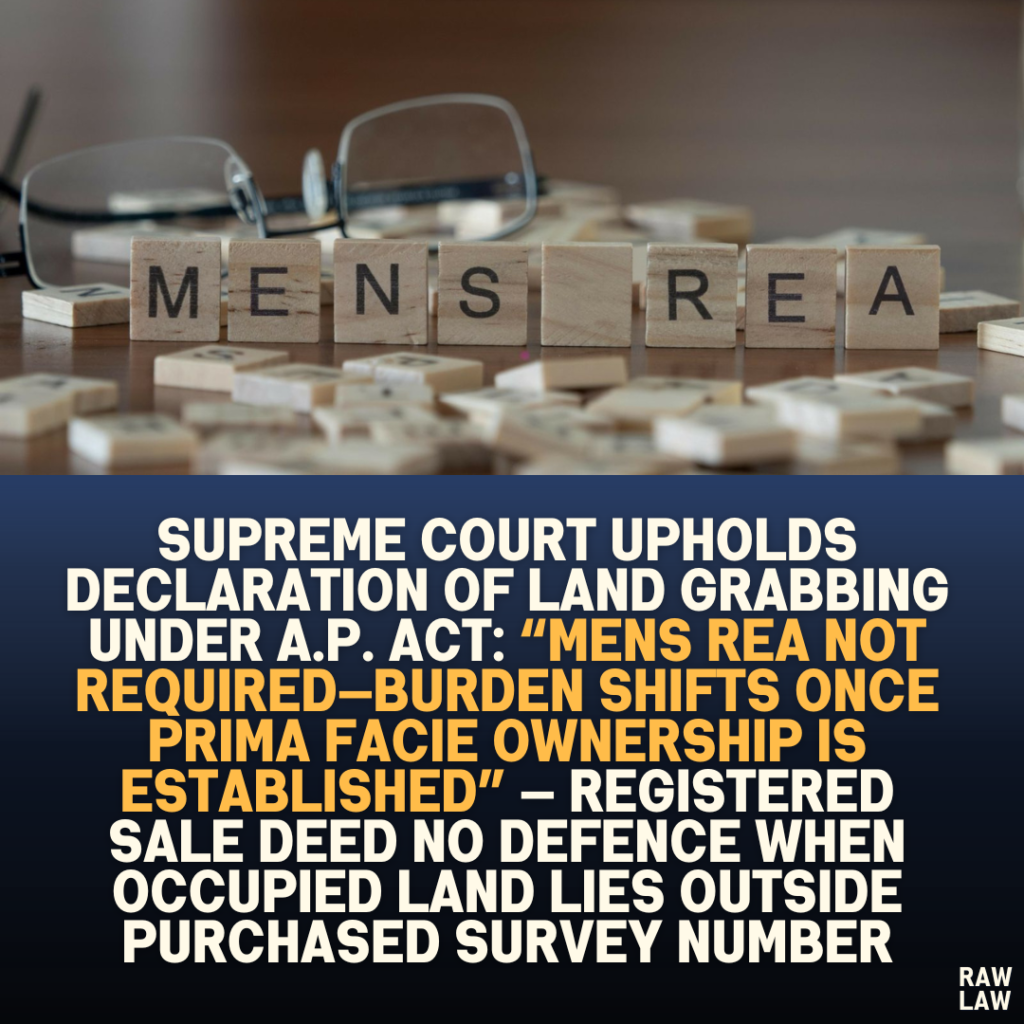Court’s Decision
The Supreme Court dismissed the appeal challenging the findings of the Special Court under the Andhra Pradesh Land Grabbing (Prohibition) Act, 1982, which had declared the appellant a land grabber. The Court upheld the decision of the Special Court and the High Court, stating that:
“We find absolutely no reason to interfere with the judgment impugned…”
It reaffirmed that under the Land Grabbing Act, once a prima facie case of ownership is made out by the complainant, the burden shifts to the alleged land grabber to rebut the presumption—something the appellant failed to do.
Facts
The appellant had purchased land under a registered sale deed dated 27.03.1997 and was residing in a double-storied house constructed on the said land. The appellant’s sale deed indicated that the land lay in survey number 10. However, the respondents (legal heirs of the original complainant) claimed that this property was actually located in survey number 9, which they owned through a registered sale deed dated 01.01.1965.
The dispute arose when the respondents initiated proceedings under the Andhra Pradesh Land Grabbing (Prohibition) Act, alleging that the appellant had illegally occupied their land.
Issues
- Whether the appellant could be classified as a ‘land grabber’ under the Andhra Pradesh Land Grabbing (Prohibition) Act, 1982?
- Whether the summary procedure under the Act violated principles of natural justice?
- Whether the Special Court’s finding based on survey reports and dismissed civil suits could be sustained?
Petitioner’s Arguments
- The appellant argued that he was a bona fide purchaser of land via a registered sale deed and had constructed a house long before any dispute arose.
- It was submitted that the Act does not apply in the absence of mens rea or criminal intent and that, at most, the appellant could be considered a trespasser.
- The appellant contended that the correct remedy was a civil suit and not proceedings under the Land Grabbing Act.
- Heavy reliance was placed on the Supreme Court’s earlier decision in Konda Lakshmana Bapuji v. Govt. of A.P. to suggest that criminality and intention are essential elements of “land grabbing”.
Respondent’s Arguments
- The respondents highlighted that their title dated back to 1965 and had been duly established before the Special Court.
- A Court-appointed Commissioner had surveyed the land and confirmed that the appellant’s property actually lay within the boundaries of survey number 9, which belonged to the complainant.
- It was further pointed out that two civil suits initiated by the appellant—one against the original applicant and one against the Municipality—had failed.
- The respondents contended that under the Act, unlawful possession with intent to create third-party rights constitutes land grabbing, even in the absence of overt criminal intent.
Analysis of the Law
The Court examined Sections 2(d), 2(e), and 10 of the Andhra Pradesh Land Grabbing (Prohibition) Act:
- The definitions under Sections 2(d) and 2(e) include within “land grabber” any person who occupies land unfairly or unlawfully, with or without overt criminal intent.
- The term “land grabbing” encompasses both narrow and broad meanings: from violent seizure to any unauthorised occupation carried out unfairly or greedily.
- Section 10 creates a rebuttable presumption once the applicant establishes prima facie ownership.
Precedent Analysis
The Court relied on its prior ruling in Konda Lakshmana Bapuji v. Govt. of A.P. [(2002) 3 SCC 258]:
“The term ‘land grabbing’ is employed in the statute, conferring on it both a narrow and broad connotation and it cannot be said that there should necessarily be criminality…”
The Court emphasized that even absent traditional criminal mens rea, unlawful possession intended to create unauthorised rights can fall within the Act’s ambit.
Court’s Reasoning
- The survey conducted by the Assistant Director of Survey and Land Records confirmed that the appellant’s property was in survey no. 9, not 10.
- The appellant’s own sale deed did not cover the disputed land.
- The Special Court and High Court had both rightly applied the shifting burden of proof, requiring the appellant to rebut the presumption once the complainant had shown prima facie title.
- The appellant’s adverse possession claim failed due to absence of proof and lack of hostile animus—especially since the complainant had initiated administrative action when construction started.
Conclusion
The Court dismissed the appeal and upheld the order declaring the appellant as a land grabber under the Act. It concluded:
“We find absolutely no reason to interfere with the judgment impugned… the survey numbers evidenced in the sale deed… together establish the allegation of land grabbing.”
Implications
This judgment clarifies that under the Andhra Pradesh Land Grabbing (Prohibition) Act:
- Mens rea is not an essential ingredient; illegal occupation with intent to claim ownership or create third-party rights suffices.
- A registered sale deed does not automatically protect against land grabbing charges if the property described in the deed is different from the one occupied.
- Once a complainant proves prima facie title, the burden shifts decisively to the alleged land grabber to rebut the presumption.
It strengthens the jurisprudence enabling prompt and effective adjudication of illegal land occupation, ensuring statutory remedies remain potent even against well-resourced individuals.




Pingback: Bombay High Court Grants Ad-Interim Anticipatory Bail in 2007 Sale Deed Forgery Case Involving Alleged Use of Forged Notary Seal; Accepts Undertaking That Document Will Not Be Acted Upon - Raw Law